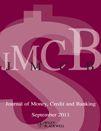Identifying Discretionary Fiscal Policy Reactions with Real-Time Data
Bruegel's deputy director Guntram Wolff co-authored with Ulf von Kalckreuth a paper published on the Journal of Money, Credit and Banking.

In this paper, the authors propose a method of identifying discretionary fiscal policy reactions using real-time data. Automatic stabilizers should depend on true GDP, while discretionary fiscal policy is contingent on the information that policy makers have in real time. We can compute a real-time measurement error by comparing the first release of GDP data with later revisions.
Discretionary fiscal policy is influenced by this measurement error, whereas automatic fiscal policy is not. The authors use this identification approach to test the central identifying assumption of Blanchard and Perotti’s (2002) seminal structural vector autoregression (VAR). According to this assumption, fiscal policy makers do not react to GDP developments contemporaneously in a discretionary fashion. This analysis finds that government expenditure is adjusted upward if GDP growth in real time is lower than true GDP. This suggests that fiscal policy makers use short-term funds to buy goods and services in response to their perception of GDP dynamics.



